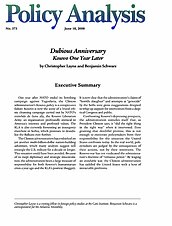One year after NATO ended its bombing campaign against Yugoslavia, the Clinton administration’s Kosovo policy is a conspicuous failure. Kosovo is now the scene of a brutal ethnic cleansing campaign carried out by NATO’s erstwhile de facto ally, the Kosovo Liberation Army, an organization profoundly inimical to America’s interests and professed values. The KLA is also currently fomenting an insurgency elsewhere in Serbia, which promises to destabilize the Balkans even further.
The Clinton administration has embarked on yet another multi-billion-dollar nation-building adventure, which many analysts suggest will entangle the U.S. military for a decade or longer. This situation could have been avoided. Because of its inept diplomacy and strategic miscalculation, the administration bears a large measure of responsibility for both Kosovo’s humanitarian crisis a year ago and the KLA’s postwar thuggery. It is now clear that the administration’s claims of “horrific slaughter” and attempts at “genocide” by the Serbs were gross exaggerations designed to whip up support for intervention from a skeptical Congress and public.
Confronting Kosovo’s depressing prospects, the administration consoles itself that, as President Clinton says, it “did the right thing in the right way” when it intervened. Even granting that doubtful premise, this is not enough to exonerate policymakers from their responsibility for the situation the United States confronts today. In the real world, policymakers are judged by the consequences of their actions, not by their intentions. The Kosovo war has not vindicated the administration’s doctrine of “virtuous power.” By waging an avoidable war, the Clinton administration has saddled the United States with a host of intractable problems
About the Authors

This work is licensed under a Creative Commons Attribution-NonCommercial-ShareAlike 4.0 International License.
